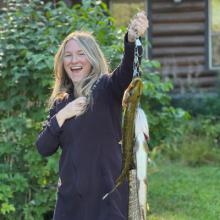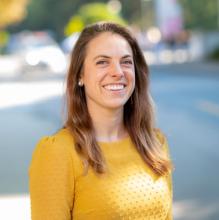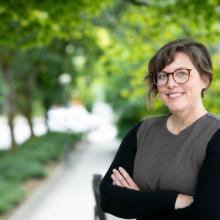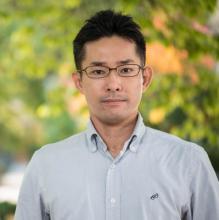I see a Public Scholar as someone who thoughtfully leans into the humanistic side of science, by valuing the intentionality and patience it takes to build community trust and respect. They recognize that these fostered relationships then have the ability to guide, inspire, and profoundly enrich our research and, ultimately, public health outcomes.
Research Description
Suicide is a major public health issue, yet preventable through evidence-based, timely, and low-barrier intervention. Youth, in particular, face unique challenges and vulnerabilities often linked to a complex and interrelated set of biological, social, and environmental factors specific to this developmental period. A severe lack of interventional strategies to address youth suicide in Canada has been previously acknowledged; a gap that has been underscored by the detrimental impact of the COVID-19 pandemic on youth mental health. Integrated youth services (IYS) offer a promising model for earlier intervention by providing a “one-stop shop” for comprehensive services that address a wide range of youth-related needs in a coordinated and accessible manner. Services include a blend of traditional and non-traditional (i.e., peer support) approaches to care, and are delivered in a youth-friendly and purpose designed space. In British Columbia (BC), Foundry is a IYS network that offers free services, both in-person and virtually, to diverse youth aged 12-24 that present with a range of health needs, including those experiencing suicide ideation (or thoughts of suicide). With the widespread scaling of the IYS model across BC and Canada, opportunities exist for youth and community to be involved in the design of treatments and services tailored to their unique needs. Using a participatory and human-centred co-design approach, this work sets out to establish a suicide care framework to improve the quality of care across the continuum of suicide prevention, intervention, and postvention care for youth accessing IYS.
What does being a Public Scholar mean to you?
Public scholarship is responsive to community needs by actively participating alongside those we intend to support. It requires meaningful and timely knowledge mobilization, which may entail going outside of your academic comfort zone to do so. I see a Public Scholar as someone who thoughtfully leans into the humanistic side of science, by valuing the intentionality and patience it takes to build community trust and respect. They recognize that these fostered relationships then have the ability to guide, inspire, and profoundly enrich our research and, ultimately, public health outcomes.
In what ways do you think the PhD experience can be re-imagined with the Public Scholars Initiative?
I think many graduate students matriculate with the intent to turn research into actionable knowledge, but lack the resources and support to do so. PSI is that bridge and more. It not only opens a door to a wide network of expertise and unique training opportunities, but serves as an advocate for students wanting to extend beyond the traditional discipline of doctoral programs. For me, being part of PSI further validates the need for new and novel approaches that directly involve youth in order to advance the field of youth suicide prevention.
How do you envision connecting your PhD work with broader career possibilities?
The early applications of this work involve the co-design and implementation of the suicide care framework within a single service centre (out of 18+ centres total) at Foundry. Once the framework has been piloted and evaluated, we will initiate the process of scaling up for translation within the Foundry network, and potentially across other integrated youth networks in Canada. My hope is that this work sets an important foundation for a broader program of research aimed at improving access and quality of mental healthcare for all Canadian youth.
How does your research engage with the larger community and social partners?
Foundry has a longstanding, trusted relationship with dozens of affiliated community partnerships across BC and nationally, including youth and their families. For this project, I will work alongside the Youth Advisory Committee (YAC) and the Youth and Family Ambassador Program (YFAP) at Foundry, both groups that constitute a diverse panel of youth (and families) with lived experience of mental health challenges and service navigation in BC. YFAP is a provincially-based network of youth and families who share experiences using IYS, and help to promote awareness and engagement in IYS across communities in BC. Both groups will play a critical role in recruitment and outreach efforts, knowledge mobilization, and co-design strategies. I plan to eventually engage with other key stakeholders, including emergency and family physicians, school administrators, and policymakers to identify screening and referral mechanisms to Foundry for timelier and continuous intervention.
Why did you decide to pursue a graduate degree?
I had been working professionally in research for nearly a decade before pursuing a PhD. During this time, I was also volunteering at a community-based mental health organization in San Francisco as a peer counselor on the call line, and later as a grant-writer, to provide support and system navigation for those experiencing mental health challenges. This is where I discovered real meaning in my work, and recognized that my research skills could be easily translated into community settings with a broader and more direct positive impact. It was empowering, and instilled a sense of curiosity and a drive to address seemingly "basic" gaps in care that were contributing to profound health inequities I witnessed when it came to youth mental health issues.
Why did you choose to come to British Columbia and study at UBC?
Vancouver is home to one of the leading IYS networks internationally. When I sought out to learn more about IYS and their potential (something that did not exist in the States at the time), it felt like a perfect fit for my interests in youth mental health and health services research. The more time I spend here, the more I realize that UBC, specifically the Human Early Learning Partnership (HELP) in the School of Population and Public Health, is truly at the forefront of early childhood development research. It’s exciting and motivating to be surrounded by mentors and colleagues pushing science forward in a meaningful way.
Public scholarship is responsive to community needs by engaging and participating alongside those we intend to support. It requires meaningful and timely knowledge translation.






